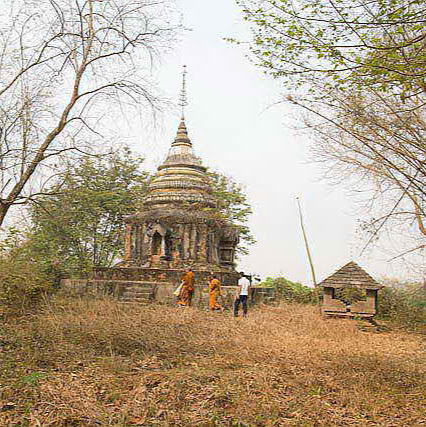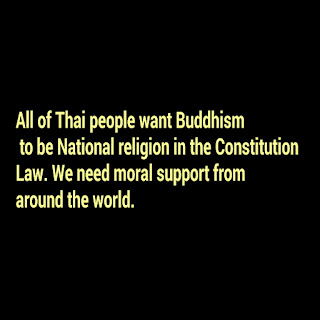15 รับศีล ๘ : taking the
Eight Precepts
The
requesting words:
Mayaṃ
bhante, ti-saranena saha Venerable
Sir, we request the Three
attha
sīlani yācāma. Refuge
& the Eight Precepts.
Dutiyampi
mayaṃ bhante, Venerable Sir, a
second time, we request
Ti-saranena
saha attha sīlani yācāma. The
Three Refuge & the Eight Precepts.
Tatiyampi
mayaṃ bhante, Venerable Sir, a
third time, we request
Ti-saranena
saha attha sīlāni yācāma. The
Three Refuge & the Eight Precepts.
Monk
then recites the following passage three times, after which the lay people
repeat
It
three times:
Namo
tassa bhagavato arahato Homage
to the Blessed One, the Worthy
Sammā-sambuddhassa. One, the Rightly
Self-awakened One.
The
monk then recites the following passages line by line, with the lay people
reciting
Line
by line after him.
Buddhaṃ
saraṇaṃ gacchāmi. I go to the Buddha for refuge.
Dhammaṃ
saraṇaṃ gacchāmi. I go to the Dhamma for refuge.
Sanghaṃ
saraṇaṃ gacchāmi. I go to the
Sangha for refuge.
Dutiyampi
Buddhaṃ saraṇaṃ gacchāmi. A
second time, I go to the Buddha for
Refuge.
Dutiyampi
Dhammaṃ saraṇaṃ gacchāmi. A
second time, I go to the Dhamma for
Refuge.
Dutiyampi
Sanghaṃ saraṇaṃ gacchāmi. A
second time, I go to the Sangha for
Refuge.
Tatiyampi
Buddhaṃ saraṇaṃ gacchāmi. A third time, I go to the Buddha for
Refuge.
Tatiyampi
Dhammaṃ saraṇaṃ gacchāmi. A
third time, I go to the Dhamma for
Refuge.
Taiyampi
Sanghaṃ saraṇaṃ gacchāmi. A third time, I go to the Sangha for
Then
monk then says:
Ti-sarana-gamaṇaṃ
nitthitaṃ. This ends the going for refuge.
The
lay people respond:
Āma
bhante. Yes,
Venerable Sir.
The
monk then recites the precepts line by line, with the lay people reciting them
line by line after him.
1.Pānātipātā
veramanī sikkhā-padaṃ I
undertake the training rule to refrain
Samādiyāmi. From
Taking life.
2.
Adinnādānā veramani sikkhā-padaṃ I undertake the training rule to
refrain
Samādiyāmi. From
stealing.
3.
Abrahma-cariyā veramani sikkhā-padaṃ I
undertake the training rule to refrain
Samādiyāmi. From
sexual intercourse.
4.
Musāvādā veramani sikkhā-padaṃ I
undertake the training rule to refrain
Samādiyāmi. From
telling lies.
5.
Surā-meraya-majja-pamādatthānā I
undertake the training rule to refrain
Veramanī
sikkhā-padaṃ samādiyāmi. From intoxicating liquor & drugs
that
Lead
to carelessness.
6.
Vikāla-bhojanā veramanī sikkhā-padaṃ I
undertake the training rule to refrain
Samādiyāmi. From
eating after noon & before dawn.
7.
Nacca-gīta-vādita-visūka-dassanā I
undertake the training rule to refrain
Malā-gandha-vilepana-dhārana-dandana- from dancing, singing, music, watching
Vibhūsanatthāna
veramani sikkhā-padaṃ shows, wearing garlands, beautifying
Samādiyāmi. Myself
with perfumes & cosmetics.
8.
Uccāsayana-mahāsayanā veramanī I
undertake the training rule to refrain
Sikkhā-padaṃ
samādiyāmi. From high &
luxurious seats & beds.
Imāni
attha sikkhā-padāni samādiyāmi. I undertake
these eight precepts.
Imāni
attha sikkhā-padāni samādiyāmi. I undertake
these eight precepts.
Imāni
attha sikkhā-padāni samādiyāmi. I undertake
these eight precepts.
Bow down three times















